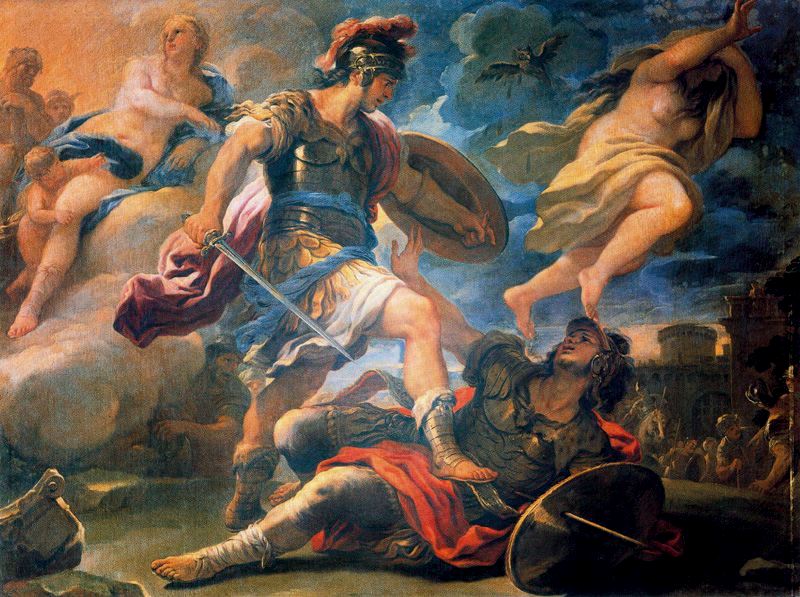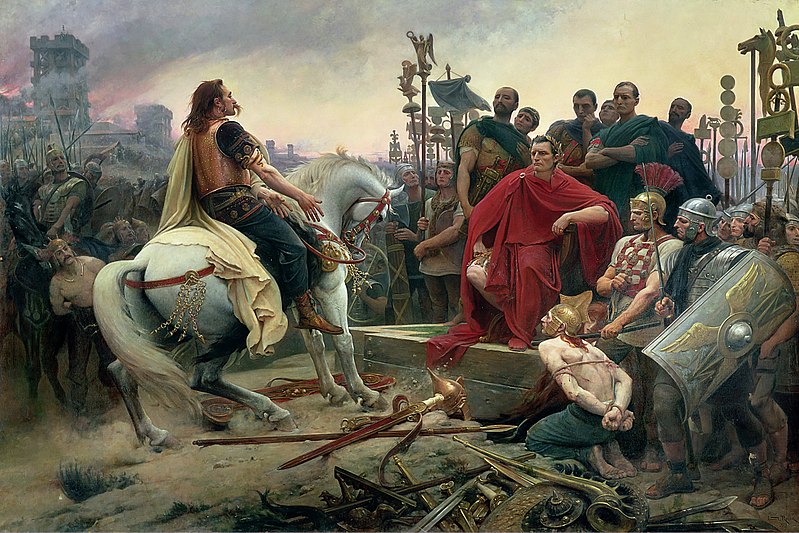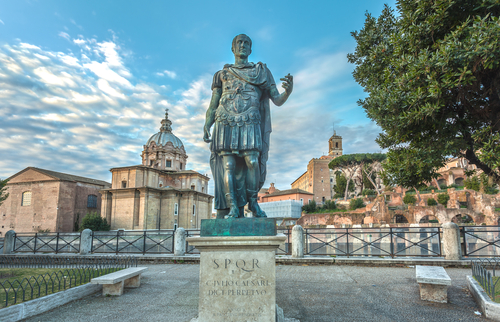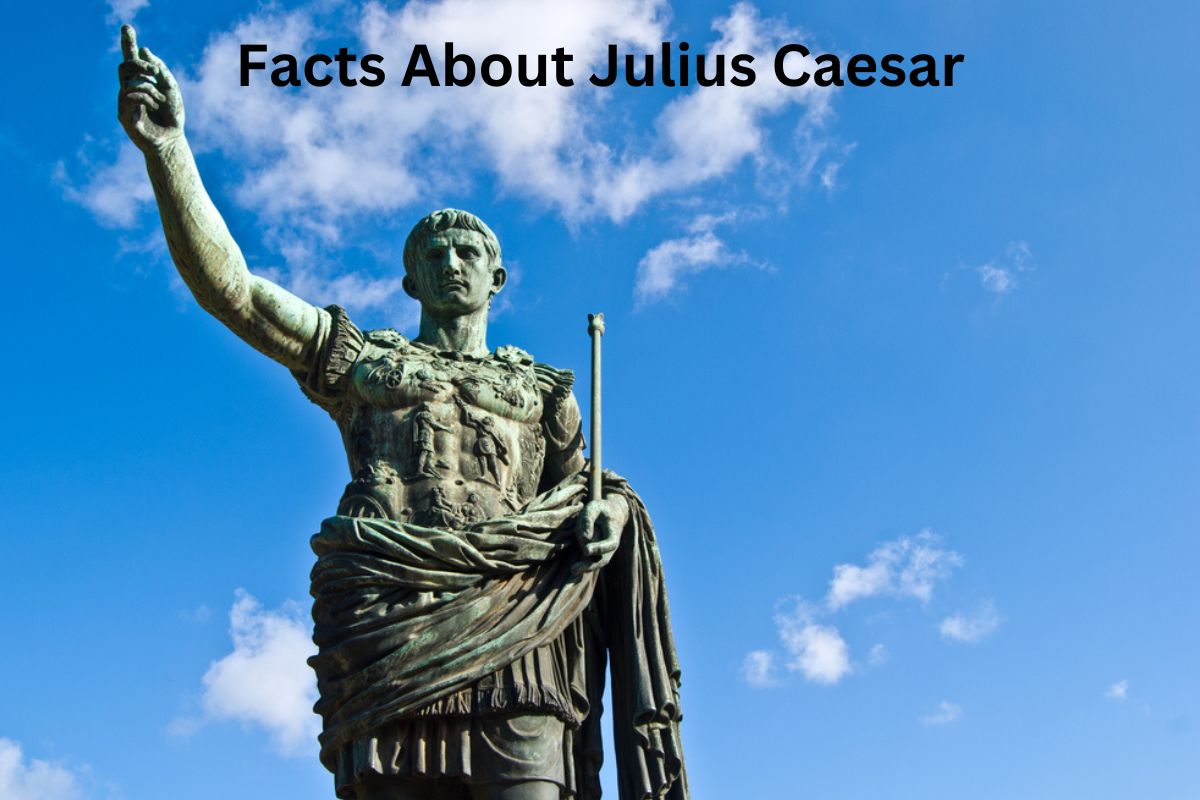Julius Caesar, one of the most iconic figures in ancient history, was a Roman statesman, military general, and influential leader who played a significant role in the transition from the Roman Republic to the Roman Empire.
Born in Rome in 100 BCE, Caesar came from a noble patrician family with a prestigious lineage that claimed descent from the legendary Trojan prince Aeneas. Known for his military prowess, political acumen, and charismatic personality, Caesar left an indelible mark on the Roman world.
His achievements include military conquests, political alliances, and significant reforms that reshaped the course of Roman history.
While his rise to power marked a turning point, his assassination ultimately set the stage for the rise of the Roman Empire under his adopted heir, Gaius Octavius, later known as Emperor Augustus.
Julius Caesar’s legacy as a brilliant military leader, shrewd politician, and transformative figure continues to captivate and inspire to this day.
Julius Caesar Facts
1. Gaius Julius Caesar was born on July 13, 100 BCE
Gaius Julius Caesar was born on July 13, 100 BCE, in Rome, Italy. He was born into a patrician family, which belonged to the highest social class in ancient Rome.
Also Read: Julius Caesar Accomplishments
His father, also named Gaius Julius Caesar, was a praetor, a magistrate with judicial authority, and his mother, Aurelia Cotta, came from a prominent family.
2. He came from a noble patrician family
Caesar’s family claimed descent from the legendary Trojan prince Aeneas, who, according to myth, fled Troy after its fall and eventually settled in Italy.

This connection to the heroic past of Rome added prestige to Caesar’s family lineage. The Julian gens, his family’s clan, was well-respected and had produced notable figures in Roman politics and military.
3. Caesar played a crucial role in the transformation of the Roman Republic into the Roman Empire
Julius Caesar played a pivotal role in the transition from the Roman Republic to the Roman Empire.
The Roman Republic was a system of government where power was shared among elected officials, while the Roman Empire centralized power in the hands of an emperor.
Also Read: Julius Caesar Timeline
Caesar’s actions and policies contributed to the erosion of the republic and the subsequent rise of emperors.
4. He was a skilled military general and is considered one of the greatest military strategists in history
Caesar was renowned for his military prowess and is considered one of the greatest military leaders in history. He displayed exceptional strategic skills, tactical brilliance, and a deep understanding of his soldiers and their morale.

His victories in numerous military campaigns earned him a reputation as an exceptional commander. Caesar’s innovative strategies, such as the double envelopment maneuver used at the Battle of Alesia, showcased his military genius.
5. Caesar is best known for his conquest of Gaul (modern-day France) during the Gallic Wars from 58 BCE to 50 BCE
One of the most significant achievements of Julius Caesar was his conquest of Gaul, a region that encompassed modern-day France, Belgium, and parts of Switzerland and Germany.

From 58 BCE to 50 BCE, Caesar led the Roman legions in the Gallic Wars, a series of military campaigns aimed at subjugating the Gallic tribes.
Through a combination of military might, political alliances, and strategic maneuvers, Caesar successfully expanded Roman territory and influence in Gaul, establishing Roman control over the region.
6. He famously crossed the Rubicon River in 49 BCE
The crossing of the Rubicon River in 49 BCE marked a pivotal moment in Julius Caesar’s life and Roman history. The Rubicon served as the boundary between Gaul (which Caesar governed) and Italy (which he was prohibited from entering with his army).
By crossing the Rubicon, Caesar defied the Roman Senate’s order, effectively declaring war on the Roman state. This act, which violated Roman law, initiated a civil war against Pompey the Great, who represented the senatorial faction.
Caesar’s decision to cross the Rubicon demonstrated his determination to seize power and marked the beginning of a struggle that would ultimately result in his rise to supreme authority in Rome.
The phrase “crossing the Rubicon” has since entered popular usage to signify a decisive, irrevocable step.
7. Caesar emerged victorious from the civil war and became the sole ruler of Rome
Following his victory in the civil war against Pompey, Julius Caesar emerged as the sole ruler of Rome. In 49 BCE, he was appointed as dictator, a temporary position granted during times of crisis.
However, in 44 BCE, he was declared “dictator perpetuo,” meaning dictator in perpetuity or dictator for life. This title bestowed upon him extraordinary powers and effectively made him the undisputed leader of Rome.
8. He implemented various reforms to stabilize the Roman Republic and consolidate his power
As a ruler, Caesar implemented several reforms aimed at stabilizing the Roman Republic and consolidating his power. He granted Roman citizenship to many provincials, extending rights and privileges to people from outside of Italy.

This move aimed to foster loyalty and support from various regions within the empire. Caesar also initiated public works projects, such as the construction of new buildings, temples, and infrastructure, which provided employment opportunities and enhanced his image as a benefactor of the Roman people.
9. Caesar was known for his charisma, political savvy, and ability to win the loyalty of his soldiers and supporters
Julius Caesar was known for his charismatic personality, political acumen, and ability to win the loyalty of his soldiers and supporters. He possessed excellent oratory skills and had a commanding presence that captivated audiences.
Caesar’s charm and ability to connect with people helped him garner support from both the common people and the Roman elite, allowing him to navigate the complex political landscape of the time.
10. He formed the First Triumvirate with Pompey and Crassus
Caesar formed the First Triumvirate, a political alliance, in 60 BCE. The Triumvirate consisted of Caesar, Pompey the Great, and Marcus Licinius Crassus. This alliance enabled Caesar to secure power and influence in Rome.
The Triumvirate’s agreement allowed Caesar to pursue his political ambitions and obtain the consulship, one of the highest offices in the Roman Republic.
The alliance, however, eventually fractured, leading to a breakdown in relations between Caesar and Pompey, ultimately leading to the civil war that resulted in Caesar’s ascension to power.
11. Caesar was a prolific writer and historian
Julius Caesar was not only a skilled military leader and politician but also a prolific writer and historian. He authored several works, but his most famous one is “Commentarii de Bello Gallico” (Commentaries on the Gallic War).
This written account provided a detailed and firsthand description of his military campaigns in Gaul. Caesar’s writing style was concise, clear, and focused on military tactics and strategies rather than personal anecdotes, reflecting his objective and disciplined approach.
12. He initiated various social and political reforms
In addition to his military and political endeavors, Caesar introduced various social and political reforms during his rule. He aimed to address issues of debt and poverty among the Roman population.
Caesar implemented the Julian laws, which focused on debt relief, the reformation of land distribution, and the regulation of rents. These measures were intended to alleviate economic burdens on the lower classes and promote stability within Roman society.
13. Caesar was named “dictator perpetuo” (dictator in perpetuity) in 44 BCE
In 44 BCE, Julius Caesar was declared “dictator perpetuo,” which meant he held the position of dictator for life. This move further solidified his power and authority in Rome.
However, the notion of a perpetual dictator went against the traditional Roman republican values, and some saw it as a step towards monarchy.
The declaration of “dictator perpetuo” contributed to growing discontent among a group of senators, which ultimately led to his assassination.
14. His assassination took place on March 15, 44 BCE, known as the Ides of March
On March 15, 44 BCE, Julius Caesar was assassinated in the Senate chamber by a group of conspirators. The conspiracy was led by Gaius Cassius Longinus and Marcus Junius Brutus, who were senators and former allies of Caesar.
The assassination took place on the Ides of March, a day that became infamous in history. The conspirators believed that Caesar’s growing power posed a threat to the Republic, and they sought to restore the traditional republican system by eliminating him.
15. Caesar’s death led to a power struggle and the eventual rise of his adopted heir, Gaius Octavius
Julius Caesar’s assassination triggered a power struggle and political unrest in Rome. It led to a series of civil wars known as the Roman Civil Wars, with competing factions vying for control. Ultimately, Caesar’s adopted heir and great-nephew, Gaius Octavius, emerged as the victor.
He would go on to become the first Roman emperor, taking the name Augustus and establishing the Roman Empire. Caesar’s death marked the end of the Roman Republic and the beginning of a new era in Roman history characterized by autocratic rule and imperial governance.
